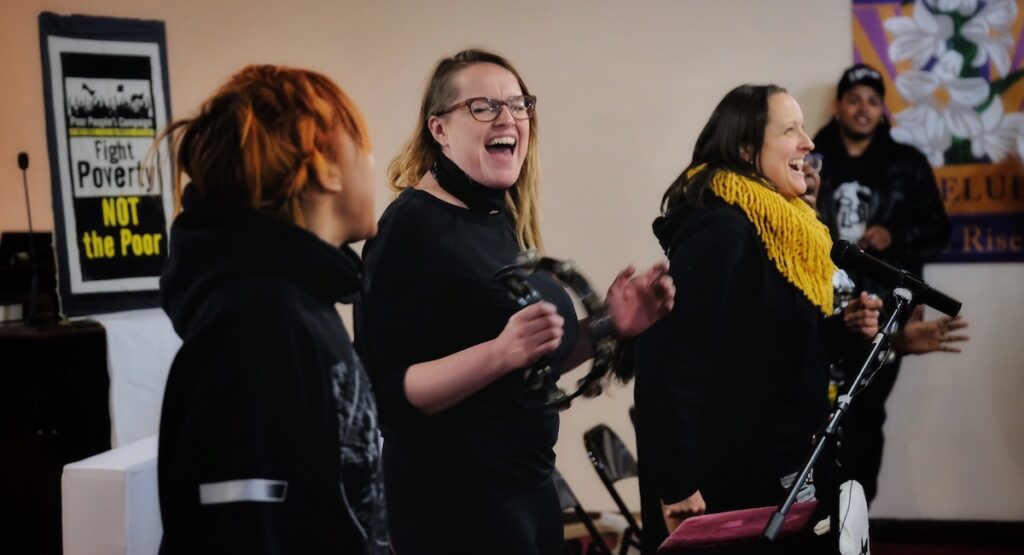
The Poor People’s Campaign: A National Call for Moral Revival launched with 40 Days of Moral Fusion Direct Action in May 2018. However, the 40 Days, which has been called the largest and most expansive wave of nonviolent civil disobedience in 21st century America, was not the beginning nor the end of what it will take to build a moral fusion movement to end poverty, systemic racism, ecological devastation and militarism in this country. The hard work of identifying, developing, and uniting leaders from poor and dispossessed communities across the historical lines that have kept us divided is the backbone of our organizing model. This is why, after building a state-based and grassroots organism of community leaders, faith leaders, poor people, advocates and activists to carry out this monumental wave of direct action, we launched a deep-dive organizing drive to continue the work of connecting poor and dispossessed communities across the country.
This is why we took up the task of organizing a National Emergency Truth and Poverty Bus Tour in over 28 states this spring to unite leaders and build the power that is needed to make the change we know is possible.
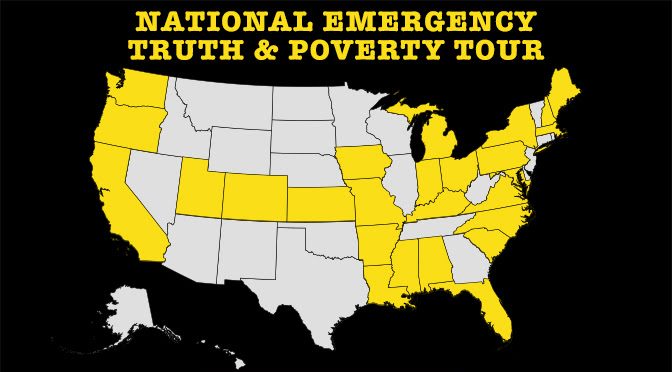
Organizing tours have been an important organizing tool in the history of our work in the Poverty Initiative and the Kairos Center. In the past, we’ve organized immersion courses where Union Theological Seminary students and grassroots community leaders traveled to places like the Gulf Coast to connect with communities confronting the aftermath of hurricanes Ivan and Katrina and the big developers who were attempting to use the disaster to push through plans that would displace longtime residents. We’ve brought poor and low income leaders from Detroit, Baltimore, Immokalee, FL, and elsewhere together with poor and low income leaders in West Virginia for week long leadership schools. Together, studied the history of the mine wars alongside the current day struggles of poor folks fighting for clean water and against water privatization, whether through mountaintop removal in WV or water shutoffs in Detroit.
We planted the seeds for the Poor People’s Campaign: A National Call for Moral Revival by bringing leaders from poor communities across the country together during the 50th Anniversary of Bloody Sunday in Selma, Alabama: not to commemorate an anniversary, but to continue the work 50 years later. We met with everyday people in Selma and Montgomery who had no heat in their homes, who had raw sewage in their lawns, and who are facing the profound reality that we have fewer voting rights today than we did when the Voting Rights Act was passed in 1965.
These, and many other organizing tours, have been a space to bring together leaders from big cities and small towns; leaders from 6 months old to 70 years old; Black, white, Latinx, Indigenous, and Asian; queer and straight; leaders from different religious and moral traditions, all to meet each other where we are at and develop a shared analysis that argues that it is our coming together as a “new and unsettling force” that will make ending poverty possible.
These organizing tours have been a place where action, education, and prophetic witness have come together to expose and shine a light on the crises facing our communities and the ways that the issues we are all confronting intersect. We know that to solve a problem, we need an accurate diagnosis of the problem. Too often our society has put forth inaccurate, incomplete, and biased diagnoses of who is poor and why we are poor. False narratives about wealth and poverty in this country breed fear, hatred, and a false sense of security among the so-called “middle class” that prevent us from organizing to address the ways the current economic and political structures are hurting the great majority of people in this nation.
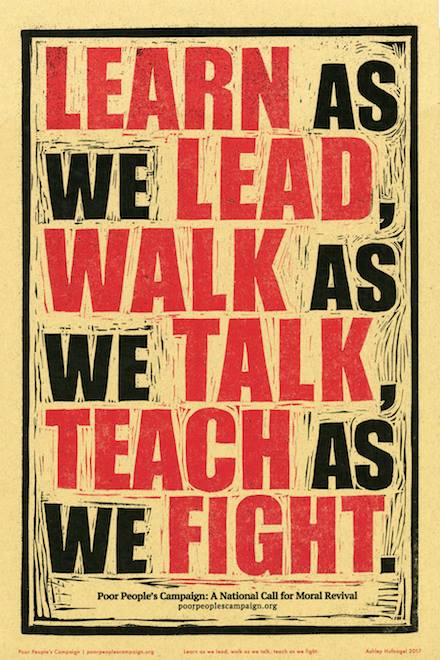
Organizing tours help to develop our understanding of the root causes and conditions of poverty through on the ground engagement. Rebekah Barber, after the North Carolina Campaign’s tour noted, “It’s one thing to read that in my home state nearly 9,000 people are homeless and nearly half of the state’s residents don’t make a livable wage, but it is quite another to hear people’s stories firsthand.”
The stories that are shared through the Truth and Poverty Tours offer deep insight not only into the conditions people are experiencing, but the reasons it is necessary to build a movement end poverty. In working to build a fusion movement, we recognize that no one community, no one organization, and no one coalition is strong enough to confront the social problems we are up against. We understand that our communities are impacted in different ways by the same root causes, and that we need to learn from one another’s experiences.
As we’ve traveled through Appalachia, the Gulf Coast, the Rust Belt, the West Coast, and the Deep South, we have worked to develop deep relationships that can dispel destructive myths and stereotypes that isolate and divide our communities. Putting forth an understanding that “the struggle is a school,” we work to build a new consciousness that there are 140 million poor and low-income people in this country, and that many more of us are just one paycheck away, or one healthcare crisis away, from poverty.
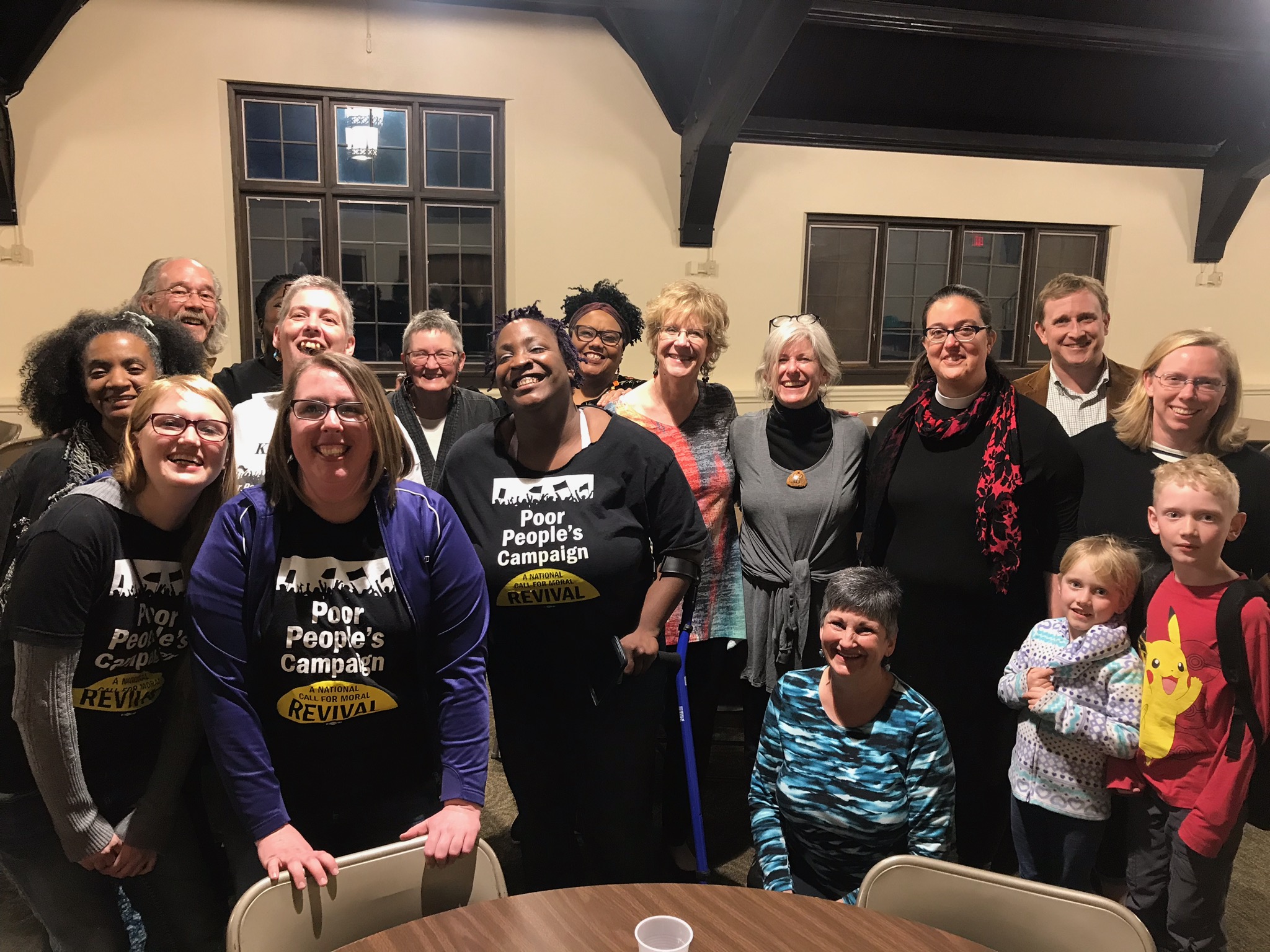
Hearing from Crossett, Arkansas, where water and air pollution is poisoning the residents; Hutchinson, Kansas, where residents have to travel up to three hours to reach a hospital; and Oregon communities where homelessness is rampant and criminalized and the homeless are attacked by police and white militias, we come to see that our shared reality embodies all major issues and illuminates not individual failure, but the social, economic, and political crisis that our country is facing today. And we know that it is only through our coming together that we can achieve a true revolution of economic and political power.
“We’re revealing the truth, and we’re healing the pain, come and join the Poor People’s Campaign!”
Organizing tours help us to shift the distorted national narrative that tells us 1) poor people are to blame for our poverty and 2) while we live in a nation of great abundance, there is not enough for all of us to survive and thrive. Whether through individual site visits at community members’ homes or public hearings where local leaders are given the opportunity to share their stories with other leaders from around the state and country, organizing tours provide a platform to highlight the plight, fight and insight of poor people and reveal the real national emergencies facing our communities.
In Maine, Mindy Bergeron-Lawrence shared,
I am one of the 544,847 faces of poor and low-income people in the state of Maine. I’ve worked at McDonalds for 16 years and currently make just 20 cents more than somebody who just walked in off the street. Most of the people I work with are struggling to get by and raise their kids; many work more than one job. These are the people that so many like to blame for their circumstances because, ‘they must be lazy’ or ‘they make poor choices.’
Systemic poverty isn’t something we can fix by suggesting someone skip their morning latte! And to those who imply the problem is laziness I would like to ask: when was the last time you took a 20 minute bike ride at 4 in the morning just to get to your 8 hour workday?
The life of a poor or low-income worker is a lot like building a house of cards: every move you make is calculated, every card accounted for, and every time you place a card you hold your breath knowing that the slightest breeze or jolt could send the whole thing crashing down! Sometimes there just aren’t enough cards! The reality of low wage work is that one sickness, one unexpected bill, one emergency, much like the bump of a table or the slightest breeze could spell disaster.
Despite what you may have heard, people like myself aren’t looking to have everything in life handed to them on a silver platter. All we really want to do is breathe.
“Organize, Organize, Organize”
Organizing tours allow us to build deep relationships across our states, to break the isolation of our communities, and to bridge historic lines that have kept our communities divided. Often times, when statewide and even national campaigns are launched, efforts focus on gathering key organizations and activating their memberships to pressure stakeholders at the state or federal legislative level. The center of gravity for this work is mobilizing people to influence those in power.
Little attention, however, is paid to building deep relationships between folks on the ground who are confronting the issues we are organizing to address. Little time is given to developing a shared understanding of the conditions our communities are facing and growing the leadership and commitment of everyday people to do this work. Organizing tours enable us to go out and connect with people who are struggling to meet their basic needs all across a state, not just in the places that are already organized. The model of the “Poor Organizing the Poor” is about building our own power. Dr. King once said, “Power for poor people will really mean having the ability, the togetherness, the assertiveness, and the aggressiveness to make the power structure of this nation say yes when they may be desirous to say no.” This means that our first step must be to organize — to develop committed, competent, clear, and connected leaders.
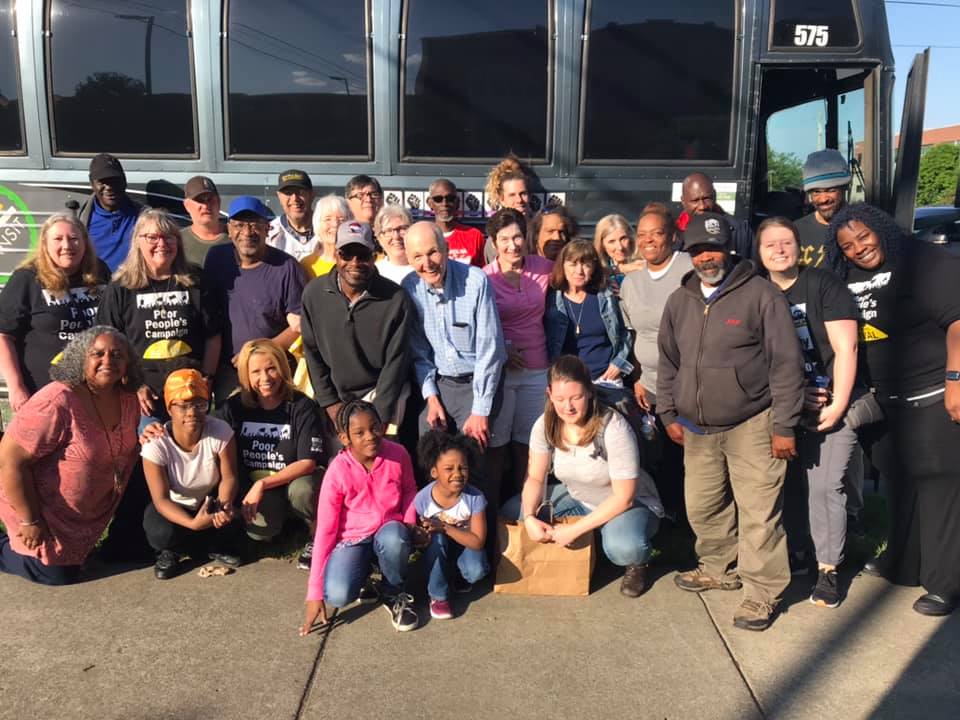
Organizing tours help us to organize people around our basic needs — the issues that are hurting our communities and what is needed to fix them. When we go out and ask people if they agree that everyone has a right to healthcare, everyone has a right to housing, everyone has a right to education, it’s not about left or right politics. It’s fundamentally about what’s right and wrong. And when we talk about building a Poor People’s Campaign — “as a movement made up of people like you, because no one is going to solve our problems but us” — people are ready and they see a place for themselves in this movement.
We went to [North Carolina] A+T where we showed what voter suppression and gerrymanders do to suppress the people’s vote and that’s not what democracy looks like! And we headed all the way down to Sanford where we dealt with immigration issues because guess what, no human being is illegal!
—Ana Ilarraza Blackburn, NC Poor People’s Campaign: A National Call For Moral Revival
Organizing tours invite us to build community around the state and with one another. When organizing to build the power of poor and working people, we realize that the struggles our communities face can leave us with a sense of fear, brokenness, and isolation. We have been taught to turn inward and blame ourselves and to blame one another. Lifting up the belief that the struggle is a school, organizing tours challenge us to revive the importance of building a beloved community. In a society that breeds individualism and an obsession with personal success, creating space to foster connections, build trust, and share responsibility for our collective well-being are radical and necessary actions. In an attempt to bring people together across lines that have historically divided us (across race, religion, region, gender, sexuality, etc.), intentional practices must be incorporated into the development of organizing tours.
There are many leaders involved and many roles needed in the work of pulling together an organizing tour. And we must acknowledge that we all have different roles to play. Whether leaders are helping to cook meals for one another, organizing home stays for those coming from a different part of the state, helping to document and publicize the work of the tours, leading singing to keep our minds grounded and our spirits lifted, organizing visits with local leaders to talk about the problems our communities are facing, or helping to facilitate group reflections about our experiences along the way, every role is important. Organizing tours are about collectively developing our leadership and identifying the strengths of the people who make up the Campaign. People are our most important resource and building a beloved community means that we must find a way to use the diverse strengths of our people to build this movement.
“And before I’d be a slave, I’d be buried in my grave, take my place with those who’ve loved and fought before.” —John L. Handcox, Southern Tenant Farmers Union
Organizing tours draw lessons from historical struggles and help us gain perspective on how social change happens. We often say that we are building a movement, not a moment. This statement is not just a catchy turn of phrase. It is an understanding of what it will take to achieve the systemic, structural changes that are necessary in our society. Deep dive organizing is about investing our time and our energy in developing leaders who are prepared to stick and stay for the long haul. We recognize that in order to win, we must not only organize harder, we must organize smarter, and learn from those who have come before us. Frederick Douglass said, “If there is no struggle, there is no progress.” Change for poor and working class people has never come without mass struggle.
The challenge in understanding the history of social movements is that we are often only taught about “movement moments” — the time that Rosa Parks sat down, the “I Have a Dream Speech” during the March on Washington, or the epic Battle of Blair Mountain. What we are not taught is that social movements do not happen overnight; they are not the product of one action taken by a charismatic leader or even the result of mass protests that arise in response to intolerable conditions.
When we begin to study the history of social movements and reflect on our own efforts to build a social movement, we realize that movements happen in stages. And we draw lessons from the struggles that have come before us. We drew strength from learning that we’re part of a strong and deep tradition of struggle for liberation in New York State. As we stood where Frederick Douglass had stood in Ithaca and spent time under Harriet Tubman’s roof in Auburn, we began to find points of reflection for our work today…As we visited people and listened to their struggles and organizing efforts, we had our ears open for clues from history. We called our bus tour a “Freedom School” for what it could teach us about our state and ourselves, and to align ourselves with those who were educators in the cause of freedom in past days.
—Tim Shenk, NYS Poor People’s Campaign: A National Call for Moral Revival
Organizing tours create a space for leaders to learn from a history of struggle. They help us to identify the newly emerging forces that exist in our work and to imagine what is necessary for fundamental change in the status quo. Reflecting on the experiences of leaders like Harriet Tubman and the Underground Railroad, we begin to see how necessity is the mother of innovation. We begin to think critically about how our communities are responding to crises and how we can utilize these responses to expose and oppose the fundamental weaknesses of the current system.
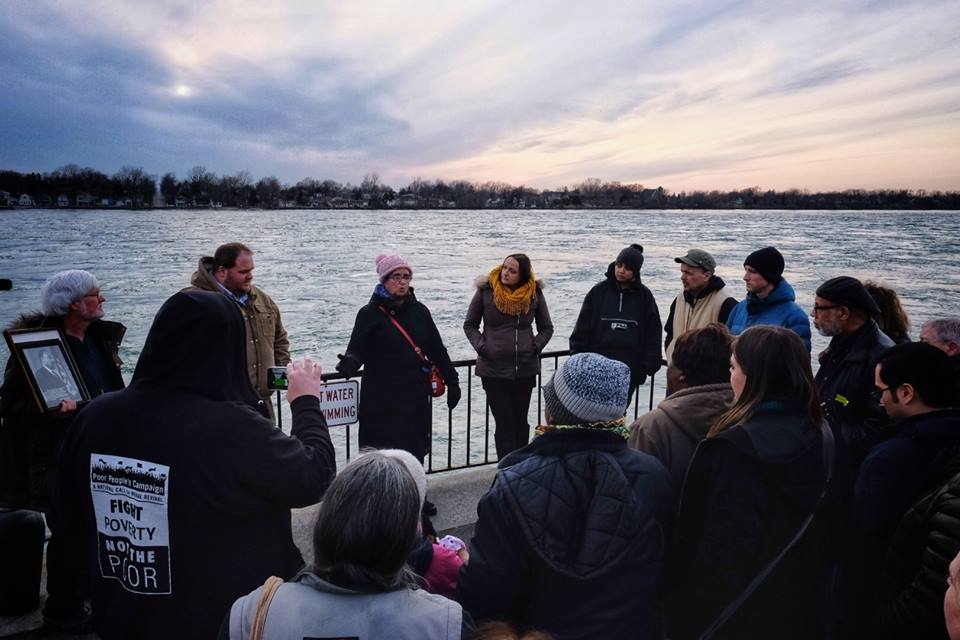
Organizing tours are about bringing leaders together, shining light on the contradictions of the current system, making new connections, and building up the kinds of fusion coalitions, led by those directly impacted, that have the power to change the direction of our nation. These tours are documenting the real emergencies that we must address, while also creating a platform for those directly impacted to put forward our agenda, our demands, and our solutions to these crises. And they help us to deepen our understanding of why we must continually build this movement, and our commitment to it, for the long haul.